关于广东省英语听说训练过来人的经验谈
- 格式:doc
- 大小:15.50 KB
- 文档页数:2
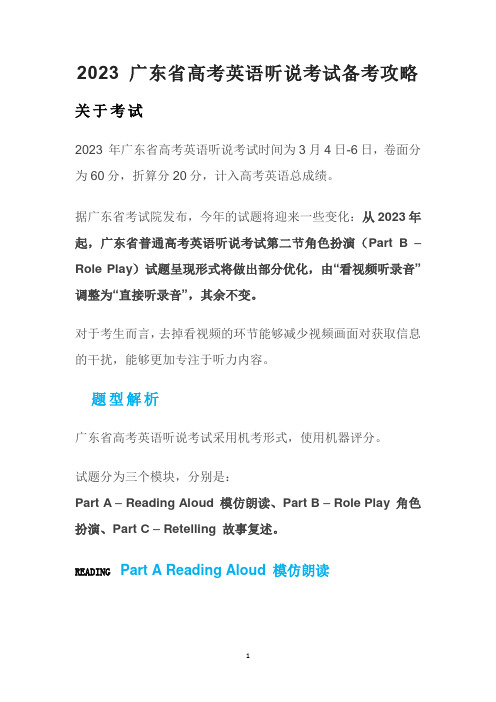
2023 广东省高考英语听说考试备考攻略关于考试2023 年广东省高考英语听说考试时间为3月4日-6日,卷面分为60分,折算分20分,计入高考英语总成绩。
据广东省考试院发布,今年的试题将迎来一些变化:从2023年起,广东省普通高考英语听说考试第二节角色扮演(Part B –Role Play)试题呈现形式将做出部分优化,由“看视频听录音”调整为“直接听录音”,其余不变。
对于考生而言,去掉看视频的环节能够减少视频画面对获取信息的干扰,能够更加专注于听力内容。
题型解析广东省高考英语听说考试采用机考形式,使用机器评分。
试题分为三个模块,分别是:Part A – Reading Aloud 模仿朗读、Part B – Role Play 角色扮演、Part C – Retelling 故事复述。
READING Part A Reading Aloud 模仿朗读考生需要观看一段大约一分钟左右的视频短片,结束后对照文字稿进行练习,再对照文字稿听录音,最后开始模仿朗读。
答题策略1.听录音听第一遍录音,留意升降调、重读、连读、弱读等,注意生词的准确发音。
2.浏览短文在第二遍录音开始前,会给出原文文字,并预留1分钟给考生练习,建议大家快速通读一遍短文,在遇到生词时标记下来,听第二遍录音时留意发音。
3.答题读的时候注意时间限制,合理分配答题时间,避免前松后紧。
语速不宜过快或过慢,正常说话语速即可。
注意事项模仿朗读要注意三个维度:准确度、流畅度、完整度。
部分考生在模仿朗读时容易出现加音错误,尤其需要注意。
举例:My brother is a singer.有相当多的同学会读成:My brothers is a singer.在这里提醒大家,虽然只是加了一个s,但是出现加音会被扣掉不少的分。
考生在平时训练的过程一定要注意避免。
重读方面,一般在句子中需要重读的是实词,即:名词、动词、形容词、副词、数词、代词等;不需要重读的多为虚词,即:冠词、连词、介词、感叹词等。
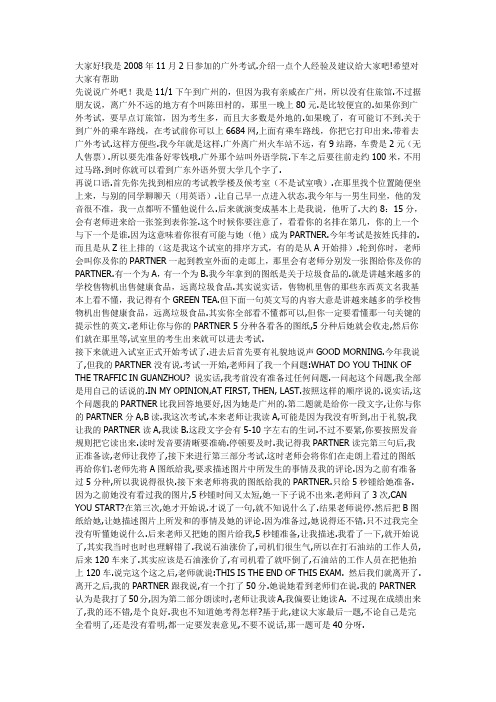
大家好!我是2008年11月2日参加的广外考试.介绍一点个人经验及建议给大家吧!希望对大家有帮助先说说广外吧!我是11/1下午到广州的,但因为我有亲威在广州,所以没有住旅馆.不过据朋友说,离广外不远的地方有个叫陈田村的,那里一晚上80元.是比较便宜的.如果你到广外考试,要早点订旅馆,因为考生多,而且大多数是外地的.如果晚了,有可能订不到.关于到广外的乘车路线,在考试前你可以上6684网,上面有乘车路线,你把它打印出来.带着去广外考试.这样方便些.我今年就是这样.广外离广州火车站不远,有9站路,车费是2元(无人售票).所以要先准备好零钱哦.广外那个站叫外语学院.下车之后要往前走约100米,不用过马路.到时你就可以看到广东外语外贸大学几个字了.再说口语.首先你先找到相应的考试教学楼及候考室(不是试室哦).在那里找个位置随便坐上来,与别的同学聊聊天(用英语).让自己早一点进入状态.我今年与一男生同坐,他的发音很不准,我一点都听不懂他说什么.后来就演变成基本上是我说,他听了.大约8:15分,会有老师进来给一张签到表你签.这个时候你要注意了,看看你的名排在第几,你的上一个与下一个是谁.因为这意味着你很有可能与她(他)成为PARTNER.今年考试是按姓氏排的.而且是从Z往上排的(这是我这个试室的排序方式,有的是从A开始排).轮到你时,老师会叫你及你的PARTNER一起到教室外面的走郎上,那里会有老师分别发一张图给你及你的PARTNER.有一个为A,有一个为B.我今年拿到的图纸是关于垃圾食品的.就是讲越来越多的学校售物机出售健康食品,远离垃圾食品.其实说实话,售物机里售的那些东西英文名我基本上看不懂,我记得有个GREEN TEA.但下面一句英文写的内容大意是讲越来越多的学校售物机出售健康食品,远离垃圾食品.其实你全部看不懂都可以,但你一定要看懂那一句关键的提示性的英文.老师让你与你的PARTNER 5分种各看各的图纸,5分种后她就会收走,然后你们就在那里等,试室里的考生出来就可以进去考试.接下来就进入试室正式开始考试了.进去后首先要有礼貌地说声GOOD MORNING.今年我说了,但我的PARTNER没有说.考试一开始,老师问了我一个问题:WHAT DO YOU THINK OF THE TRAFFIC IN GUANZHOU? 说实话,我考前没有准备过任何问题.一问起这个问题,我全部是用自己的话说的.IN MY OPINION,AT FIRST, THEN, LAST.按照这样的顺序说的.说实话,这个问题我的PARTNER比我回答地要好,因为她是广州的.第二题就是给你一段文字,让你与你的PARTNER分A,B读.我这次考试,本来老师让我读A,可能是因为我没有听到,出于礼貌,我让我的PARTNER读A,我读B.这段文字会有5-10字左右的生词.不过不要紧,你要按照发音规则把它读出来.读时发音要清晰要准确.停顿要及时.我记得我PARTNER读完第三句后,我正准备读,老师让我停了,接下来进行第三部分考试.这时老师会将你们在走朗上看过的图纸再给你们.老师先将A图纸给我,要求描述图片中所发生的事情及我的评论.因为之前有准备过5分种,所以我说得很快.接下来老师将我的图纸给我的PARTNER.只给5秒锺给她准备.因为之前她没有看过我的图片,5秒锺时间又太短,她一下子说不出来.老师问了3次,CAN YOU START?在第三次,她才开始说.才说了一句,就不知说什么了.结果老师说停.然后把B图纸给她,让她描述图片上所发和的事情及她的评论.因为准备过,她说得还不错.只不过我完全没有听懂她说什么.后来老师又把她的图片给我,5秒锺准备,让我描述.我看了一下,就开始说了,其实我当时也时也理解错了.我说石油涨价了,司机们很生气,所以在打石油站的工作人员,后来120车来了.其实应该是石油涨价了,有司机看了就吓倒了,石油站的工作人员在把他抬上120车.说完这个这之后,老师就说:THIS IS THE END OF THIS EXAM. 然后我们就离开了.离开之后,我的PARTNER跟我说,有一个打了50分.她说她看到老师们在说.我的PARTNER 认为是我打了50分,因为第二部分朗读时,老师让我读A,我偏要让她读A. 不过现在成绩出来了,我的还不错,是个良好.我也不知道她考得怎样?基于此,建议大家最后一题,不论自己是完全看明了,还是没有看明,都一定要发表意见,不要不说话,那一题可是40分呀.下午是听力考试.说实话,那天考试前,我看到很多同学在练习.我没有练,第一是因为我那天早上病了,人不舒服,第二是因为我手机没有电了,无法听.考试前1个小时,我就与一个考友在聊天,直到考试前15分锺,我才赶到试室.当我到时,别人都准备好了,耳机也试好音了.我刚找好位置,又要去洗手间.老师要我快点回来.回来后我一带起耳机,就有录音(放心,这只是试音部分,考试还没开始).这时你要调好音量,削好铅笔,准备好橡皮擦及签字笔,准考证及身份证.因为听力考试时,时间很紧张,你根本没有时间准备.我这次就是因为没有准备好,结果考试时有几个题目要改答案,我都没有橡皮更改.听力考试分为5部分,总分100分建议发下试卷后,把第一题的答案全部快速浏览一遍.第一部分为STATEMENT,就是读一句话,让你在选项中选意思相近或相同的.说实话,有点难,题与题之间的间隔为10秒.再加上语速较快,如果没有听明,就无法选选项.个人建议:如果上一题没有听明,就选一个选项稍长一点的.意思要符合实际的.不要因为上一题没有听明,一直在看答案,这样会耽误下一题的.第二部分为SHORT CONVERSATION.今年这一题与大学英语4级的历年试题完全一样.所以我做得很快,一听CONVERSATION,不听问题,我都知答案哪个正确了.建议大家多听大学英语4,6级的历年试题,对考试有帮助第三部分为SHORT PASSAGE,这题有4个小短文,今年有2篇是出自大学英语4级历年试题的短文.说实话,有难度.建议在听播音员读题目时,赶快看选项.当播音员正式读PASSAGE时,集中精神,记下关键词语.当播放第二遍时,再记多一点关键词语,尤其是与选项相关的.读问题时,可以凭自己记下的关键词语选答案.这样会容易很多.我这种方法是训练大学英语4,6级听力时练的.我发现很多同学都没有这么做.他们的草稿纸是空白的.第四部分是VOA新闻.不用说,此题全部出题新闻听力教程(1-4册)的文章.这次考试,有很强烈的杂音.但我基本上还是能听明.不是很难,大家考试前一定要听新闻听力教程.熟悉播音员的声音哦.第五部分是完形填空,读四遍.说实话,不难,但写单词一定要快,因为两个要填的单词隔得很近.我是从第一遍开始,就在蓝稿纸上记下空缺的单词(单词都是很简单的,大部分在高中都学过)最后会有5分种检查.这时最好看下第五题的单词有没有写正确.及前面的选项有没有划错. 另外此次听力考试有很多问题:1. 录音不清楚,2. 有些题没有念问题就跑到下一题去了3. 题与题之间的间隔没有10秒,我估计最多7秒但我的成绩还可以:口语良好,听力优秀朋友,口语与听力真的不难,但大家考前一定要有所准备.希望以上的个人经验及建议能帮到以后要到广外考试的朋友.加油!聽力與口語考試關鍵還是大家平時要多練.如果沒有PARTNER,就自己對自己練吧!如拿一段小文章(有趣味性的),先看幾遍原文,再用自己的話說出來.天天這樣練習.對口語會有較大的幫助的.聽力,就多上普特英語聽力網,那里有各種級別的聽寫練習.當然高手是很多的.剛開始,大家可以練習VOA SPECIAL ENGLISH.過幾個月後就練STANDARD.很快你的聽力會有一個質的飛躍.如果你能聽懂STANDARD NEWS,那考試根本就是小菜一碟了.非常好。

广东省高考英语听说考试高分攻略Part A模仿朗读题型说明:要求考生观看一段大约一分钟的片段,然后考生开始模仿训练:先阅读文字稿,再对照文字稿听录音。
完成训练之后考生开始模仿朗读:考生对照片断的字幕朗读,要求考生的语音、语调和语速尽可能与片断保持一致。
答题技巧:在准备的时候,可以先快读通读一遍,熟悉内容,尤其对于比较难或较长的单词,提前熟悉发音,如果遇到生词,应用自然拼读法尝试发音,不要停住。
在朗读时,发音要饱满准确,语速适中,特别要注意升降调及意群停顿等节奏,同时要把握好录音朗读时间。
失分点分析:模仿朗读题型的评分主要分为三个维度:准确度、流畅度、完整度。
根据评分维度,下表列出了各个维度失分的失分点。
从上表可以看出,加音在准确度的权重占3颗星,所以可以看出加音很重要。
举例1:His father is a worker.*有相当多的同学会读成:His fathers is a workers.举例2:I have no interest(ing).*很多同学把interest读成了interesting.在这里特别要提醒各位考生,虽然只是加了一个s,或者加了一个(ing),但是通过评分标准来看,这个对短文朗读的扣分还是很明显的。
考生在平时训练的过程一定要注意避免。
再如:I don’t thin(k)I can do i(t)at the momen(t).I am not clever(er)than you.*吞音导致准确度扣分严重,完整度也会失分!很多同学会把think中的[k]的发音给丢掉,这其实就是吞音,还有比如一些比较级,很多同学会把clever(er)中的尾音吞掉,而吞音对于准确度失分也是占很大的权重的。
所以学生在练习过程中一定要适当纠正。
Part B角色扮演题型说明:要求考生观看一段大约两分钟的片段,明确自己拟要扮演的角色以及要完成的任务。
看完片段之后首先根据中文提示,准备20秒钟后用英语提出三个问题,计算机将回答考生的提问;然后计算机向考生提出五个问题,考生必须根据自己所听的内容(包括片段和计算机的回答两部分)回答问题,回答问题之前考生有10秒钟的准备时间。

4个方面教你如何提高英语听说能力提高英语听说能力是许多学习者的共同目标,以下提供四个方面的建议,以帮助你提高英语听说能力。
1.大量听力练习-注重多种听力素材:多听英语新闻、英语电影、英语纪录片、英语歌曲等各种类型的英语素材,以提高对不同语速、口音和语调的理解能力。
-听力反复练习:多次听同一段素材,如新闻、对话等,以加深对内容的理解和记忆,从而提高听力水平。
-训练听力细节:注重细节的捕捉,如人名、时间、地点、数字等,这有助于提高听力准确度。
2.口语练习-参加口语班或组织英语角:与他人交流是提高口语能力的关键。
参加口语班或英语角活动,与其他学习者共同练习口语表达,相互交流,纠正发音错误。
-实践对话:找到英语母语者或其他有流利口语的人,进行实践对话,锻炼自己的口语技能。
3.提高词汇量-阅读英语原版书籍:选择适合自己水平的英语原版书籍,通过阅读提高词汇量和理解能力。
-多做词汇练习:使用词汇卡片、词汇软件等方法,扩大并巩固词汇量。
-运用词汇:积极使用所学的词汇,尽可能多地运用到日常生活和练习中。
4.学习英语语法和语音规则-学习语法基础知识:了解英语语法的基本规则,能够正确构建句子和理解语法结构。
-学习语音规则:掌握英语中音标和发音规则,尤其是英语中常见的音标和发音问题。
其他建议:-制定学习计划:为提高英语听说能力制定合理的学习计划,并且坚持执行。
-学习语境:学习英语是为了交流,学习者应该注重学习语言的实际运用,提高在真实场景中的听说能力。
-多利用学习资源:利用在线学习平台、英语学习网站和移动应用程序等丰富的学习资源,提高学习效率和便利性。
-模仿母语者:模仿英语母语者的发音、语调和语速,这有助于提高听力和口语水平。
-不怕犯错:不要害怕犯错,大胆地尝试和表达自己的想法。
只有通过错误和纠正才能真正提高。
提高英语听说能力需要大量的练习和坚持,通过以上的建议,相信你可以不断进步并取得明显的提高。
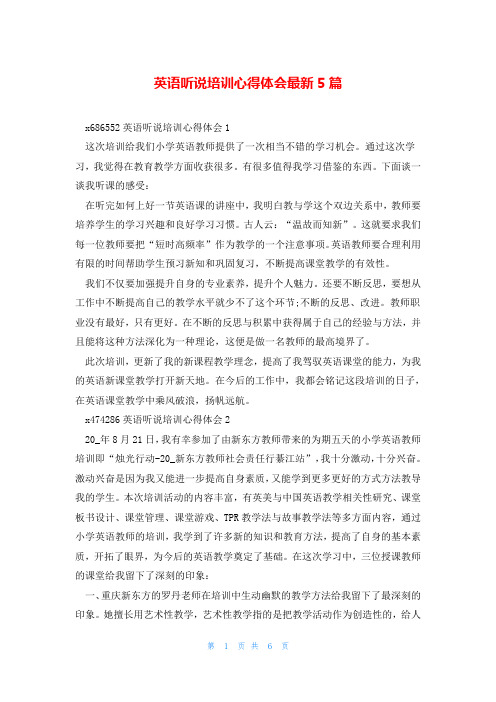
英语听说培训心得体会最新5篇x686552英语听说培训心得体会1这次培训给我们小学英语教师提供了一次相当不错的学习机会。
通过这次学习,我觉得在教育教学方面收获很多。
有很多值得我学习借鉴的东西。
下面谈一谈我听课的感受:在听完如何上好一节英语课的讲座中,我明白教与学这个双边关系中,教师要培养学生的学习兴趣和良好学习习惯。
古人云:“温故而知新”。
这就要求我们每一位教师要把“短时高频率”作为教学的一个注意事项。
英语教师要合理利用有限的时间帮助学生预习新知和巩固复习,不断提高课堂教学的有效性。
我们不仅要加强提升自身的专业素养,提升个人魅力。
还要不断反思,要想从工作中不断提高自己的教学水平就少不了这个环节;不断的反思、改进。
教师职业没有最好,只有更好。
在不断的反思与积累中获得属于自己的经验与方法,并且能将这种方法深化为一种理论,这便是做一名教师的最高境界了。
此次培训,更新了我的新课程教学理念,提高了我驾驭英语课堂的能力,为我的英语新课堂教学打开新天地。
在今后的工作中,我都会铭记这段培训的日子,在英语课堂教学中乘风破浪,扬帆远航。
x474286英语听说培训心得体会220_年8月21日,我有幸参加了由新东方教师带来的为期五天的小学英语教师培训即“烛光行动-20_新东方教师社会责任行綦江站”,我十分激动,十分兴奋。
激动兴奋是因为我又能进一步提高自身素质,又能学到更多更好的方式方法教导我的学生。
本次培训活动的内容丰富,有英美与中国英语教学相关性研究、课堂板书设计、课堂管理、课堂游戏、TPR教学法与故事教学法等多方面内容,通过小学英语教师的培训,我学到了许多新的知识和教育方法,提高了自身的基本素质,开拓了眼界,为今后的英语教学奠定了基础。
在这次学习中,三位授课教师的课堂给我留下了深刻的印象:一、重庆新东方的罗丹老师在培训中生动幽默的教学方法给我留下了最深刻的印象。
她擅长用艺术性教学,艺术性教学指的是把教学活动作为创造性的,给人带来美感的艺术活动来对待,充分发掘学生的学习语言潜力的一种教学手段。
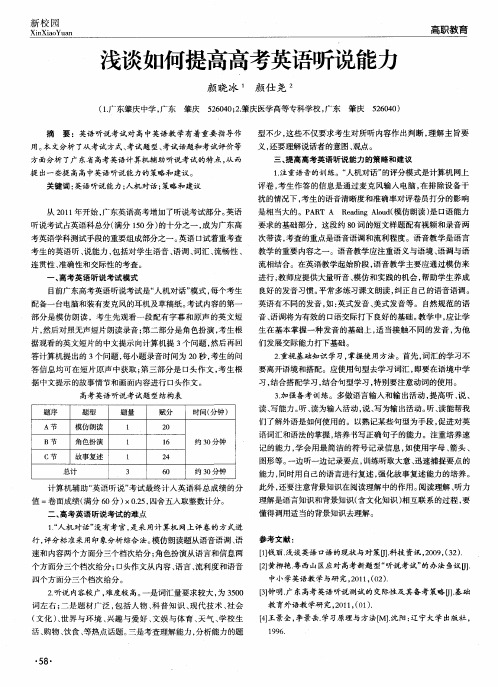

2024-2025广东高考英语听说考试三问整理2024 A1.James 像你一样酷爱音乐吗?Does James like music as much as you?2.James 小时候对什么感爱好?What was James interested in when he was young?3.谁给你们的影响最大? Who had the biggest effect/ influence on you? /Who influenced you most?2024 B1. 你能再多说点吗?Could you please speak a little more?2. 你说的学习风格是什么意思?What do you mean by ―learning styles?3)你是如何学习外语的?How did you learn a foreign language?2024 C1.你如何看待在英国排队的事情?What do you think of queuing in England?2.你能说说英国人吗?Can you talk about English people?3. 你还有别的困难吗?Do you have any other problems?2024 D1. 那我该做什么呢?What should I do?2. 我还须要留意什么吗?What else should I pay attention to?3. 你觉得我须要吃药吗?Do you think I need to take some medicine?2024 E1.英国人喜爱旧车吗?Does the British people like cars?2.你什么意思呢? What do you mean?3.英国人不太在乎穿什么衣服,对吗? The British people care little about clothes, do they?2024 A1.你和你的室友相处得如何?How do you get along with your roommates?2.为什么你不干脆与他们谈一谈?Why don’t you have a talk directly with them?3.你的老师的建议是什么?What are your teacher’s suggestions? /What is your teacher’s advice?2024 B1. 我为什么不能与挚友们一起开车?Why can’t I drive with my friends?2. 我真的须要这些规则吗?Do I really need these rules? / Are these rules necessary for me?3. 这些规则有什么用处?What are these rules for? / What’s the use of these ru les?2024 C1. 这本书有什么问题?What’s the problem of the book?2. 为什么你认为情节难以信任?Why do you think the plot is hard to believe/ unbelievable?3. 报纸怎么评论这本书?How do the newspapers comment on/upon this book?/ What are the newspapers’ comments on this book?2024 D1.我一次可以借几本书呢? How many books can I borrow at one time?2.我可以借多长时间呢? How long can I keep the books?3.我假如还书晚了会怎么样?What will happen if I return the books late?2024 E1.你想在艺术学院学习什么专业?What subject do you want to study at the arts campus?2.你在这一领域得过奖吗?Have you won any races in this field?3.你是如何发展出对历史的爱好的?How do you develop an interest in history?1`在将来的教室里互联网有什么用?What is the use of the Internet in the future classroom? / What is the Internet for in the future classroom? / What role will the Internet play in the future classroom?2. 将来学生如何参与考试?How will students take exams in the future?3. 将来学生须要学习什么?What will students need to study/ learn in the future? / What is necessary for students to learn/ study in the future?2024 B1.我怎样才能使他们共同工作呢?How can I make them work together? / How do I make them work as a team? / What can I do to make them work together?2. 你认为什么时候召集开会最好呢?What do you think is best to call them for a meeting? / What do you think is the best time to call everyone for meeting? / When do you think is best to call a meeting?3. 作为领导,我应当怎样对待团队成员呢?How should I treat my teammates as a leader? / How should I treat my team members as a monitor?2024 CQ1:体育运动在英国中学和高校里重要吗?Is sport important in British middle schools and universities? / Are sports important in British high schools and universities?Q2:哪些体育运动在英国最流行?What are the most popular sports in Britain/ England? / What sports are the most popular ones in Britain/ England?Q3:体育运动是不是谈话中的常用话题?Is sports a common topic in conversation? / Is sports the thing most talked about?2024 D1.你什么时候下班?When do you finish work?/ What time are you off work?/When do you get off work?/ What time do you finish work?/ What time do you get off work?2.你们晚上有哪些活动?What do you do in the evenings?/ What activities do you have in the evenings?/ What are your evening activities?3.你常常带工作回家吗? Do you often bring work home?/ Do you often take work home?2024 E1.我还要带其它衣服吗?Shall I take other clothes?/ Do I need to take other clothes?/ Do I have to take other clothes?/ Is it necessary for me to take other clothes?2.英国人喜爱什么样的礼物?What kind of presents/ gifts do the British people like?/ What kind of presents are the British people fond of?/ What kind of presents do the British like?我去别人家吃饭时,我要带些什么?What shall I take when I go to others’ to have meals?/ What shall I take when I have meals at others’ home?/ What should I take if I go to others’ house for dinner?/What should I take if I visit others for dinner?/ What should I take if I am invited t o others’ for dinner?1.我怎样才能留下良好的印象呢?How can I leave a good impression?/ How can I make a good impression?/ What can I do to make a good impression?/ What can I do to leave a good impression?2.我应当知道的下一个重要事情是什么?What is the next important thing I should know?/ What is the next important thing I should be aware of? 3.假如我不记得某一个英语词,改怎么办呢?What should I do if I don’t remember an English word?/ What should I do if I don’t remember some English word?/ What should I do if I forget one English word?/What if I forget an English word?2024A1、颜色怎样影响我们的购买行为?How do colors affect our buying decisions?/How do colors influence our buying decisions?/How do colors influence our purchasing behavior?/How do colors affect our buying behavior?/How do colors influence our buying behavior?/How do colors affect our purchasing behavior?2、什么颜色对顾客更具吸引力?What color is more attractive to customers?/What color can attract customers more?/What color can appeal to more customers?/What color can attract people’s attention more?/What color can draw people’s attention more?3、绿色是广告中流行的颜色吗?Question 3:Is green a popular color in advertising?/Is green a fashionable color in advertising?2024B1、你们怎么解决老人的健康问题?How do you solve old people’s health problem?/How do you deal with old people’s health problem?2、谁支付他们在这里的生活费用?Who pays for their living expenses here?/Who pays them for the living expenses here?3、他们的子女多久来探望他们一次?How often do their children come to see them?/How often do their children come to visit them?2024C1、你父母通常允许你自己做确定吗?Do your parents usually allow you to make decisions by yourself?/Do your parents usually permit you to make decisions by yourself?2、你为什么要离开父母生活呢?Why do you want to live without your parents?/Why do you want to leave your parents and live alone?3、谁支付你的生活费用?Who pays for your living costs?/Who pays for your living expenses?/Who pays you for the living costs?/Who pays you for the living expenses?2024D1、你们家是什么时候起先养导盲犬的?When did your family begin to raise dogs for the blind?/When did your family start raising dogs for the blind?/When did your family begin raising dogs for the blind?/When did your family start to raise dogs for the blind?2、你们是如何训练这些狗的?How do you train these dogs?3、你在街上见到过你们训练的狗吗?Did you see the dogs you trained in the street?/Did you see the dogs you trained on the road?/Have you seen the dogs you trained before in the street?/Have you seen the dogs you trained before on the road?2024E1、你不是说你想当一名语言老师吗?Question 1:Didn’t you say you wanted to be a language teacher?/Didn’t you say you wanted to become a language teacher?/Didn’t you say you wanted to work as a language teacher?2、你第一天教课感觉如何?How do you feel the first day of teaching?/How was your first day of being a teacher?/How was your first day of teaching?3、为什么你认为自己能成为语言老师?Why do you think you can become a language teacher?/Why do you think you can be a language teacher? 2024F1、你父母喜爱中国的什么呢?What do your parents like about China?/What do your parents love about China?/What are your parents fond of about China?2、为什么你不买些京剧DVD作为礼物?Why don’t you buy some Beijing Opera DVDs as gifts?/Why don’t you buy some Beijing Opera DVDs as presents?/Why not purchase some Beijing Opera DVDs as presents?/Why not purchase some Beijing Opera DVDs as gifts?3、你准备给弟弟和妹妹买些什么礼物呢?What gifts do you plan to buy for your brother and sister?/What presents do you plan to buy for your brother and sister?/What presents do you plan to purchase for your brother and sister?/What gifts do you plan to purchase for your brother and sister?/What gifts do you decide to buy for your brother and sister?/What presents do you decide to buy for your brother and sister?/What gifts do you decide to purchase for your brother and sister?/What presents do you decide to purchase for your brother and sister?2024A1. 你做过这个话题的探讨吗?Have you done the research about the topic?/ Have you done the survey about the topic?/ Have you researched the topic?/ Have you studied the topic?2. 人们一般做些什么来削减压力呢?What do people usually do to reduce stress?/ What do people often do to reduce stress?/ What do people usually do to relax?/ What do people often do to relax?/ What do people usually do to relieve pressure?/ What do people often do to relieve stress?3. 为什么压力可以是正能量呢?Why can stress be positive energy?/ Why can stress be positive thing?/ Why can pressure be positive energy?/ Why can stress be positive thing?2024B1. 什么是变更坏心情最有用的方法?What is the most useful way to change a bad mood?/ What is the most useful way to change a bad feeling?/ What is the most useful thing to change a bad mood?/ What is the most useful thing to change a bad feeling?/ What is the most useful method to change a bad mood?/ What is the most useful method to change a bad feeling?/ What is the most effective way to change a bad mood?/ What is the most effective method to change a bad feeling?2. 音乐有助于变更坏心情吗?Is music helpful to change a bad mood?/ Is music helpful to change a bad feeling?/ Does music contribute to changing a bad mood?/ Does music contribute to changing a bad feeling?/ Is listening to music helpful to change a bad mood?/ Is listening to music helpful to change a bad feeling?3. 颜色怎样影响我们的心情?How do colors affect our moods?/ How do colors influence our moods?/ How do colors affect our feelings?/ How do colors influence our feelings?/ How do colors have an influence on our moods?/ How do colors have an influence on our feelings?2024C1. 对你来说最大的挑战是什么?What is the biggest challenge to you?/ What is the greatest challenge to you?/ What is the biggest challenge for you?/ What is the greatest challenge for you?2. 你认为每个人都可以被培训成好老师吗?Do you think that everyone can be trained to be a good teacher?/ Do you think that everyone can be trained to become a good teacher?/ Do you think everyone can be trained as a good teacher?/ Can everyone be trained to be a good teacher?/ Can everyone be trained to become a good teacher?3. 好老师有什么特点?What characteristics do good teachers have?/ What features do good teachers have?2024D1. 两者之间的区分是什么?What’s the difference between them?/ What’s the difference between the two?/ What are th e differences between them?/ What are the differences between the two?2. 我须要参与每一次的活动吗?Do I need to attend every activity?/ Do I need to take part in every activity?/ Do I need to participate in every activity?/ Do I need to attend each activity?/ Do I need to take part in each activity?/ Do I need to participate in each activity?/ Is it necessary for me to attend every activity?/ Is it necessary for me to take part in each activity?3. 我怎样才能加入这个协会呢?How can I join this club?2024E1. 你的家乡离这里远吗?Is your hometown far from here?2. 回家乡的路上给你印象最深刻的是什么?What impressed you most on the way to your hometown?/ What impressed you best on the way to your hometown?/ What gave you the deepest impression on the way to your hometown?/ What was the most impressive thing on your way to your hometown?3. 你现在更喜爱在哪儿过春节呢?Where do you prefer to spend the Spring Festival?/ Where do you like more to spend the Spring Festival? 2024F1. 你怎么看待穿校服?How do you think about wearing school uniforms?/ What do you think of wearing school un iforms?/ What’s your opinion about wearing school uniforms?2. 穿同样的衣服不烦吗?Isn’t it boring to wear the same clothes?/ Isn’t wearing the same clothes boring?/ Don’t you feel bored towear the same clothes?3. 你小时候穿校服吗?Did you wear school uniforms when you were young?/ Did you wear school uniforms when you were a kid?/ Did you wear school uniforms when you were a child?/2024G1. 高校课程是怎样支配的?How are the university classes arranged?/ How are the university courses arranged?/ How are the college classes arranged?/ How are the college courses arranged?/ How are the classes arranged in university?/ How are the courses arranged in college?2. 你们高校会给学生供应出国学习的机会吗?Does your university offer the students a chance to study abroad?/ Does your university give the students a chance to study abroad?/ Does your university provide the students with a chance to study abroad?/ Does your college offer a chance to study abroad to the students?/ Does your college give a chance to study abroad to the students?/ Does your university provide the students with a chance to study abroad?3. 你们高校哪个系最好?Which department is the best in your university?/ Which is the best department in your university?/ Which department is the best in your college?/ Which is the best department in your college?2024A1.在大家庭中成长是怎样的?What was it like growing up in a big family?/ How did you like growing up in a big family?/ What was growing up in a big family like?2. 最艰难的部分是什么?What was the most difficult part?/ What was the hardest part?/ What was the toughest part?/ What was the most difficult thing?/ What was the hardest thing?/ What was the toughest thing?3.年幼的孩子比年长的孩子更幸运吗?Are younger children luckier than the elder children?/ Are younger children more fortunate than the elder children?2024 B1.你12岁时,学校是怎样的?How was the school when you were twelve?/ What was the school like when you were twelve?2.你认为体育活动将是一样的吗?Do you think that sports will be the same?/ Will sports be the same in your opinion?3. 最大的变更会是什么?What will the biggest change be?/ What is the biggest change going to be?/ What can the biggest change be?/ What will the greatest change be?/ What is the greatest change going to be?2024 C1. 那是什么意思呢?What does that mean?/ What do you mean?2.作为老师,你怎样运用这个系统?How did you use the system as a teacher?/ As a teacher, how did you use the system?/ How did you use the system being a teacher?/ Being a teacher, how did you use the system?/ How did you use the system working as a teacher?3.学生们喜爱这种交作业的方式吗?Did the students like the way to submit assignments?/ Did the students like the way of submitting assignments?/ Did the students like the way to hand in homework?/ Did the students like the way of handing in homework?/ Did the students like the way to hand in assignments?/ Did the students like the way of handing in assignments?2024 D1.你做什么让观众大笑?What do you do to let the audience laugh?/ What do you do to make the audience laugh?2. 你是怎么成为一个喜剧演员的?How did you become a comedian?3.有什么胜利的秘诀吗?Do you have any secrets to success?/ What secrets to success do you have?/ Are there any secrets to success? 2024 E1.你从课程中学到了什么?What do you learn from the course?/ What do you study from the course?2.你怎么知道女性在学习语言方面做得更好?How do you know that women can do better in learning languages?3.他们在行为上有什么差异?What are the differences in their behaviors?/ What is the difference about their behaviors?2024A1.那是什么意思呢?What does that mean?2.你有许多空闲时间旅游吗?Do you have much free time for traveling?3.游客能找到哪些工作呢?What jobs can visitors find?/ What kinds of jobs can travelers find?2024B1.你认为机器人有一天会取代人类吗?Do you think that robots will replace humans one day?/Do you think that robots will replace human beings some day?2.机器人可以做哪些危急的工作?What dangerous work can robots do?/ What dangerous jobs can robots take over?3.假如我们被机器人取代了该怎么办?What if we are replaced by robots?/ What should we do if we are replaced by robots?2024C1,为什么家长认为这是个问题?Why do parents regard this as a problem?/ Why do parents think of this as a problem?Why do parents think this is a problem?2.这仅仅发生在童年吗?Does this only happen in the childhood?3.你有什么建议给家长呢?What advice do you have for the parents?2024D1.那个医生是如何帮助你的?How did that doctor help you?/What are the disadvantages of e-doctors’ seeing patients?/What are the defects of e-doctors’ seeing patients?2.现在有许多人以这种方式看病吗?Are there many people to see a doctor in this way now?3. 网络医生看病的弊端是什么?What are the disadvantages of e-doctors’ seeing patients?/ What are the defects of e-doctors’ seeing patients? 2024E1.你什么时候起先对丝绸历史感爱好的?When did you start to have interest in silk history?/ When did you start to take interest in silk history?/ When did you begin to be interested in silk history?2. 中国丝绸如何传播到其他国家?How did Chinese silk spread to other countries?3.丝绸工业的现状是什么?What is the present situation of silk industry?/ What is the current situation of silk industry?2024F1.你怎么知道的呢?How did you know that?2.为什么运动能使我们更聪慧?Why can sports make us smarter?/ Why can sports make us more intelligent?3.运动如何帮助提升我们的课堂表现?How do sports help improve our performance in class?2024A1.学生是如何受到睡眠影响的?How do students get affected by sleep?/ How are students influenced by sleep?/ How does sleep influence the students?/ How does sleep affect the students?/ How does sleep have an influence on students?2. 睡眠好还有其他什么好处吗?Are there any other benefits of good sleep?/ Does good sleep have any other benefits?3. 那意味着我们应当多睡觉吗?Does that mean we should sleep more?/ Does that mean we should get more sleep?/ Does that mean we should sleep a lot?2024B1.你们有哪些活动?What activities do you have?2.提问真的有那么难吗?Is it really difficult to ask questions?/ Is it really difficult to ask?/ Is it really hard to ask questions?/ Is it really hard to ask?3.我怎样加入俱乐部?How do I join the club?/ How can I join the club?2024C1. 他们为什么这样做?Why do they do so?2. 那意味着我可以穿任何衣服吗?Does that mean I can wear casually?/ Does that mean I can wear any clothes?/ Does that mean I can wear casual clothes?/ Does that mean I can dress casually?3. 我怎么知道在我的公司该穿什么?How do I know what I need to wear in my company?/ How do I know what I should wear in my company?/ How can I know what I need to wear in my company?/ How can I know what I should wear in my company? 2024D1.那是什么意思?What does that mean?2. 让你印象最深刻的设计是什么?What design impressed you most?/ What design impressed you best?/ What is your most impressive design?/ What is the most impressive design for you?3.这栋大楼里还有其他新设计吗?Are there any other new designs in the building?。
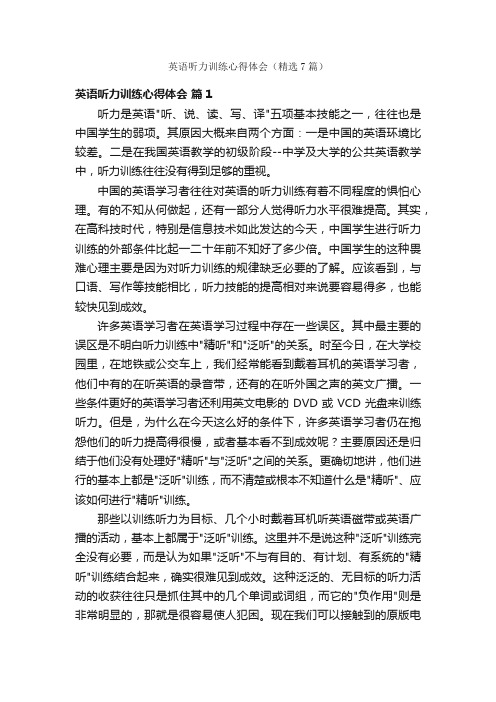
英语听力训练心得体会(精选7篇)英语听力训练心得体会篇1听力是英语"听、说、读、写、译"五项基本技能之一,往往也是中国学生的弱项。
其原因大概来自两个方面:一是中国的英语环境比较差。
二是在我国英语教学的初级阶段--中学及大学的公共英语教学中,听力训练往往没有得到足够的重视。
中国的英语学习者往往对英语的听力训练有着不同程度的惧怕心理。
有的不知从何做起,还有一部分人觉得听力水平很难提高。
其实,在高科技时代,特别是信息技术如此发达的今天,中国学生进行听力训练的外部条件比起一二十年前不知好了多少倍。
中国学生的这种畏难心理主要是因为对听力训练的规律缺乏必要的了解。
应该看到,与口语、写作等技能相比,听力技能的提高相对来说要容易得多,也能较快见到成效。
许多英语学习者在英语学习过程中存在一些误区。
其中最主要的误区是不明白听力训练中"精听"和"泛听"的关系。
时至今日,在大学校园里,在地铁或公交车上,我们经常能看到戴着耳机的英语学习者,他们中有的在听英语的录音带,还有的在听外国之声的英文广播。
一些条件更好的英语学习者还利用英文电影的DVD或VCD光盘来训练听力。
但是,为什么在今天这么好的条件下,许多英语学习者仍在抱怨他们的听力提高得很慢,或者基本看不到成效呢?主要原因还是归结于他们没有处理好"精听"与"泛听"之间的关系。
更确切地讲,他们进行的基本上都是"泛听"训练,而不清楚或根本不知道什么是"精听"、应该如何进行"精听"训练。
那些以训练听力为目标、几个小时戴着耳机听英语磁带或英语广播的活动,基本上都属于"泛听"训练。
这里并不是说这种"泛听"训练完全没有必要,而是认为如果"泛听"不与有目的、有计划、有系统的"精听"训练结合起来,确实很难见到成效。
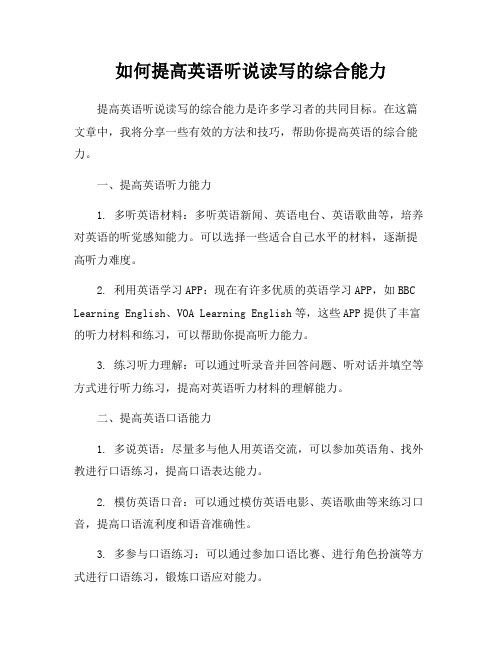
如何提高英语听说读写的综合能力提高英语听说读写的综合能力是许多学习者的共同目标。
在这篇文章中,我将分享一些有效的方法和技巧,帮助你提高英语的综合能力。
一、提高英语听力能力1. 多听英语材料:多听英语新闻、英语电台、英语歌曲等,培养对英语的听觉感知能力。
可以选择一些适合自己水平的材料,逐渐提高听力难度。
2. 利用英语学习APP:现在有许多优质的英语学习APP,如BBC Learning English、VOA Learning English等,这些APP提供了丰富的听力材料和练习,可以帮助你提高听力能力。
3. 练习听力理解:可以通过听录音并回答问题、听对话并填空等方式进行听力练习,提高对英语听力材料的理解能力。
二、提高英语口语能力1. 多说英语:尽量多与他人用英语交流,可以参加英语角、找外教进行口语练习,提高口语表达能力。
2. 模仿英语口音:可以通过模仿英语电影、英语歌曲等来练习口音,提高口语流利度和语音准确性。
3. 多参与口语练习:可以通过参加口语比赛、进行角色扮演等方式进行口语练习,锻炼口语应对能力。
三、提高英语阅读能力1. 多读英语原版书籍:选择适合自己水平的英语原版书籍,通过阅读提高词汇量和阅读理解能力。
2. 利用英语学习网站:有许多优质的英语学习网站,如BBC Learning English、TED等,这些网站提供了丰富的英语阅读材料,可以帮助你提高阅读能力。
3. 练习阅读理解:可以通过阅读文章并回答问题、阅读短文并填空等方式进行阅读理解练习,提高对英语文章的理解能力。
四、提高英语写作能力1. 多写英语作文:可以选择一些常见的话题,如环境保护、健康生活等,进行英语写作练习,提高写作能力。
2. 学习写作技巧:学习一些常用的写作技巧,如使用连接词、运用丰富的词汇等,提高写作表达能力。
3. 请教老师或朋友:可以请教英语老师或英语学习伙伴,让他们帮助你修改作文,提供反馈和建议,帮助你提高写作水平。
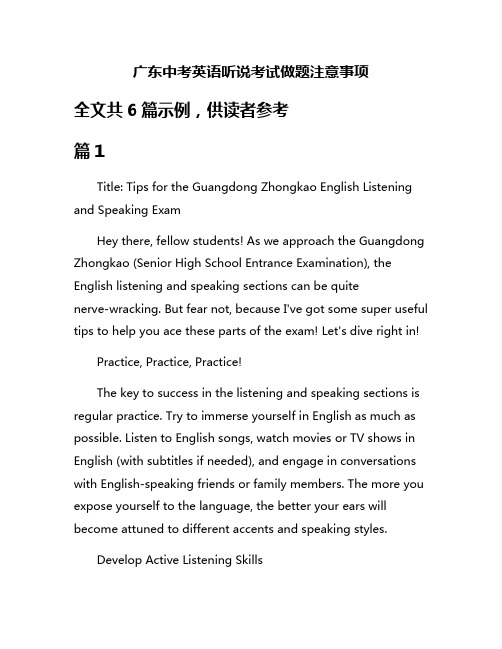
广东中考英语听说考试做题注意事项全文共6篇示例,供读者参考篇1Title: Tips for the Guangdong Zhongkao English Listening and Speaking ExamHey there, fellow students! As we approach the Guangdong Zhongkao (Senior High School Entrance Examination), the English listening and speaking sections can be quitenerve-wracking. But fear not, because I've got some super useful tips to help you ace these parts of the exam! Let's dive right in!Practice, Practice, Practice!The key to success in the listening and speaking sections is regular practice. Try to immerse yourself in English as much as possible. Listen to English songs, watch movies or TV shows in English (with subtitles if needed), and engage in conversations with English-speaking friends or family members. The more you expose yourself to the language, the better your ears will become attuned to different accents and speaking styles.Develop Active Listening SkillsActive listening is crucial for the listening comprehension part of the exam. Pay close attention to the questions and instructions before the audio clip starts playing. Jot down any key words or phrases that might help you identify the main idea or specific details. During the audio, focus intently and try to pick up on contextual clues, such as the speaker's tone, emotions, and any background noises that might provide additional information.Don't Panic if You Miss SomethingIt's perfectly normal to miss a word or a sentence here and there during the listening section. Don't panic or get discouraged! Instead, keep calm and try to piece together the overall meaning from the parts you did understand. Sometimes, the context can help you make an educated guess about the missing information.Practice Speaking Out LoudFor the speaking portion of the exam, it's essential to practice speaking out loud. This will help you get comfortable with the sound of your own voice and build confidence in your English pronunciation and fluency. Try recording yourself and listening back to identify areas for improvement. You can also practice with friends or family members and ask for feedback.Work on Pronunciation and IntonationClear pronunciation and proper intonation can make a big difference in how well you're understood during the speaking section. Pay attention to the way native English speakers stress certain syllables and use intonation to convey meaning. Practice tongue twisters, read aloud from English books or articles, and mimic the speech patterns of native speakers from audio or video materials.Learn Common Idioms and ExpressionsEnglish is full of idioms and expressions that can be confusing for non-native speakers. Make an effort to learn and understand some of the more common ones, as they frequently appear in listening and speaking exams. Being familiar with these phrases will not only improve your comprehension but also allow you to use them naturally in your own speech.Stay Calm and ConfidentRemember, the examiners want you to do well! They're not trying to trip you up or make you feel inadequate. Approach the listening and speaking sections with confidence and a positive attitude. Take a few deep breaths before you begin, and remind yourself that you've prepared diligently for this moment.Don't Be Afraid to Ask for ClarificationIf you don't understand a question or instruction during the exam, don't hesitate to ask the examiner for clarification. It's better to ask and get the information you need than to risk misunderstanding and providing an incorrect response.Use Your Time WiselyIn the speaking section, you'll often be given a short preparation time before you need to respond. Use this time efficiently to organize your thoughts, jot down any key points you want to mention, and mentally rehearse your response. Effective time management can help you deliver a clear and well-structured answer.Learn from Your MistakesAfter the exam, take some time to reflect on your performance. Identify areas where you struggled, and make a plan to work on those weaknesses. Learning from your mistakes is an essential part of the journey towards mastering English listening and speaking skills.Remember, the Guangdong Zhongkao is a significant milestone, but it's not the end of the road. Approach it with a positive mindset, and trust in the hard work and preparationyou've put in. With these tips and a little bit of determination, you'll be well on your way to acing the English listening and speaking sections!Good luck, my fellow students! You've got this!篇2Important Tips for the Guangdong Zhongkao English Listening and Speaking ExamHey there, fellow students! As we all know, the Guangdong Zhongkao English exam is just around the corner, and it's a big deal for us. The listening and speaking sections can be quite challenging, but don't worry, I've got some tips that will help you ace them!Tip 1: Practice, practice, practice!I can't stress this enough – practice is key! The more you practice listening to English conversations and dialogues, the better you'll get at understanding different accents, intonations, and speech patterns. Try to find some authentic English materials, like movies, TV shows, or podcasts, and listen to them regularly. You can also ask your English teacher or parents to have conversations with you in English.Tip 2: Learn those tricky words and phrasesThere are always some words and phrases that tend to trip us up during the listening section. Make a list of these tricky words and phrases, and practice them until you can understand them without any issues. Some examples might be homophones (words that sound the same but have different meanings), idioms, or slang expressions.Tip 3: Pay attention to context cluesWhen you're listening to a conversation or dialogue, pay close attention to the context clues. These clues can help you understand the overall meaning, even if you don't catch every single word. Things like the tone of voice, the relationships between the speakers, and the situation they're in can give you valuable clues.Tip 4: Learn some speaking strategiesFor the speaking section, it's important to have some strategies up your sleeve. One great strategy is to use filler words or phrases like "um," "well," or "you know" to give yourself some extra thinking time. Another strategy is to repeat the question or prompt in your answer to help you stay on track.Tip 5: Practice speaking out loudDon't just practice your speaking skills in your head – make sure to practice out loud! This will help you get used to the physical act of speaking English, and it will also help you work on your pronunciation and fluency. You can practice by recording yourself and listening back, or by having conversations with friends or family members.Tip 6: Learn some common expressions and idiomsIn spoken English, we often use a lot of expressions and idioms that might not make sense if you translate them literally. Try to learn some common expressions and idioms that are used in everyday conversation, and practice using them in your own speaking.Tip 7: Don't be afraid to ask for clarificationIf you don't understand something during the listening section, don't be afraid to ask the examiner for clarification. They're there to help you, and it's better to ask for clarification than to guess and get it wrong.Tip 8: Stay calm and confidentFinally, one of the most important tips is to stay calm and confident during the exam. It's normal to feel a little nervous, buttry to stay positive and focused. Remember that you've been preparing for this, and you've got this!Well, there you have it – my top tips for the Guangdong Zhongkao English listening and speaking exam. I hope these tips help you feel more prepared and confident. Just remember to practice, stay calm, and believe in yourself. You've got this!Good luck, and happy studying!篇3Ace the Guangdong Zhongkao English Listening and Speaking TestHey there, fellow students! As we all know, the Guangdong Zhongkao (or high school entrance exam) is a really big deal. And the English listening and speaking section can be pretty tough! But don't worry, I've got some awesome tips to help you prep and do your best on test day.First up, listening skills! Listening comprehension questions make up a huge part of this exam, so it's super important to practice, practice, practice. But how do you do that? Well, my number one tip is to listen to English audio as much as you possibly can. Whether it's English movies, TV shows, songs,podcasts, or audio books - immerse yourself in that English audio world!It might seem boring at first, but the more you listen, the easier it will become to understand different accents, speaking speeds, and vocabulary. You can even try watching your favorite cartoons or kid's shows in English. It's a fun way to level up your listening skills!When you're practicing, make sure to pay close attention and not just have the audio playing in the background. Actively listen for key details, phrases, and expressions. Pause frequently to make sure you understand what's going on. You can even take notes on the main ideas as you're listening.It's also a great idea to look up any new words or phrases you don't understand. The more vocabulary you know, the easier it will be to comprehend those fast-paced listening passages on test day. Build up that English word power!Next up, let's talk about speaking skills. This part of the test can feel really nerve-wracking, but just remember - the examiners aren't trying to trip you up. They just want to see how well you can communicate in English. So take a deep breath and try to stay calm and confident.One of the best ways to prepare is by practicing speaking out loud as much as possible. You can record yourself on your phone and listen back to check your pronunciation, fluency, and grammar. Or find a classmate to do mock conversations and roleplays with.When you're practicing speaking, imagine you're talking to a friend or family member, not a scary examiner. Use facial expressions, hand gestures, and changes in tone and volume to make your English sound more natural and expressive. The more you practice sounding conversational, the better you'll do on test day.It's also really important to work on building up your vocabulary and trying to use a range of sentence structures. Don't just stick to simple, repetitive phrases. Show off those fancy English words and grammatical skills you've been learning!If you get stuck or nervous during the exam, don't panic. Take a second to gather your thoughts, and if you need to, politely ask the examiner to repeat the question. It's totally okay to buy yourself some extra time.For any opinion-based or open-ended questions, make sure to give full, detailed answers with reasons and examples to backup your points. The examiners want to see you can express your ideas clearly and in-depth.Another top tip - learn some transition words and phrases to smoothly connect your thoughts and ideas. Words like "furthermore," "in addition," "for example," and "on the other hand" will make your speaking flow much better.Okay, now for some general exam advice. In the weeks leading up to the test, get plenty of rest and eat brain-boosting foods to keep your energy and focus up. Do lots of practice tests, too, so you get used to the test format and timing.On exam day, wake up early, dress comfortably, and give yourself plenty of time to get to the test center, so you don't feel rushed. During any breaks, drink water, eat a healthy snack, and do some deep breathing to stay hydrated and calm.Most importantly, don't stress too much! You've been studying hard, and you've got this. Just do your best, and try to actually enjoy showing off your awesome English skills. You're going to do great!Well, those are my best tips for conquering the English listening and speaking section of the Zhongkao. Keep practicing,stay positive, and remember - English is a super fun and useful language to learn. You've got this!篇4Hey there, fellow students! As we're gearing up for the big Guangdong Zhongkao exams, I wanted to share some super important tips for tackling the English listening and speaking sections. These parts can be pretty tricky, but with the right strategies, you'll be able to ace them like a pro!First up, let's talk about the listening section. This part can be a real ear-bender, but don't worry, I've got your back! One of the most important things to remember is to stay focused throughout the entire recording. It's so easy to zone out, especially if the topic doesn't interest you, but you've got to fight that urge and keep those ears perked up.Another key tip is to listen for context clues. The speakers might give hints about what they're talking about, like mentioning a place, activity, or situation. Picking up on these little nuggets can help you figure out the overall theme, even if you don't understand every single word.It's also super helpful to practice your listening skills beforehand. Watch English movies or TV shows, listen topodcasts or songs, and tune in to English radio stations. The more you expose yourself to different accents and speaking styles, the easier it'll be to understand the recordings during the exam.Now, let's move on to the speaking section. This part can be nerve-wracking, but remember, the examiners aren't trying to trip you up – they just want to see how well you can communicate in English.One of the best tips I can give you is to speak slowly and clearly. It's better to take your time and enunciate properly than to rush through and end up mumbling or making mistakes. And don't be afraid to ask the examiner to repeat the question if you didn't catch it the first time around.Another important strategy is to use simple, straightforward language. You don't need to bust out fancy vocabulary words or complex sentence structures. In fact, that might just confuse the examiner. Stick to words and phrases you're comfortable with, and focus on getting your point across clearly.It's also a good idea to practice speaking out loud beforehand. You can do this by recording yourself answering sample questions or having conversations with a friend or familymember in English. The more you practice, the more comfortable and confident you'll feel during the actual exam.One final tip for both the listening and speaking sections: don't let yourself get flustered if you make a mistake or hit a rough patch. Take a deep breath, refocus, and keep going. The examiners understand that English isn't your first language, and they're not expecting perfection.Well, there you have it, folks – my top tips for conquering the Guangdong Zhongkao English listening and speaking exams. Remember, with plenty of practice, a positive attitude, and these strategies in your back pocket, you'll be well on your way to success!So, what are you waiting for? Start prepping today, and show those exams who's boss! You've got this, and I'll be cheering you on every step of the way. Good luck, my fellow English warriors!篇5Title: Ace the Guangdong Zhongkao English Listening and Speaking Test!Hey there, fellow students! As we gear up for the Guangdong Zhongkao, one of the most important exams we'llface is the English Listening and Speaking test. It might seem daunting, but fear not! With the right preparation and mindset, you can conquer this challenge like a pro. Here are some super handy tips to help you out:Listen Up!The listening part of the exam can be tricky, but the key is practice, practice, practice! Try to expose yourself to as much English audio as possible. Watch movies, listen to songs, podcasts, or even audiobooks in English. This will help train your ears to pick up on different accents, tones, and speech patterns. The more you listen, the better you'll get at understanding spoken English.Speak Out LoudDon't be shy! Speaking English out loud is crucial for improving your fluency and confidence. Read passages, answer questions, or even have conversations with yourself in English. It might feel silly at first, but trust me, it works wonders! You can also practice with friends or family members, taking turns to ask and answer questions. The more you speak, the more comfortable you'll become with the language.Tune in to Tone and IntonationEnglish isn't just about the words; it's also about how you say them. Pay attention to the tone and intonation used by native speakers. Notice how their voices rise and fall, and how they stress certain syllables or words. This will help you sound more natural and expressive when you speak.Build Your VocabularyThe more words you know, the better you'll understand and express yourself in English. Make flashcards, play word games, or use vocabulary apps to expand your word bank. Don't just memorize words, but also learn how to use them in context. The richer your vocabulary, the more confident you'll feel during the speaking portion of the exam.Stay Calm and ConfidentFeeling anxious is normal, but try not to let it get the best of you. Remember that you've been preparing for this, and you've got what it takes to succeed. Take deep breaths, visualize yourself doing well, and go into the exam with a positive mindset. Confidence is key!Take Notes WiselyDuring the listening part, you'll need to take notes to help you answer questions later. Develop your own shorthand orabbreviations to jot down key points quickly. Don't try to write everything down; focus on the main ideas and important details.Manage Your Time Wisely ⏱️Time management is crucial in any exam, and the Zhongkao English Listening and Speaking test is no exception. Keep an eye on the clock and pace yourself accordingly. Don't spend too much time on a single question; move on and come back to it later if you have time.Don't Be Afraid to GuessIf you're unsure about an answer during the listening section, don't panic! Make an educated guess based on the context clues and the information you've gathered. Sometimes, awell-informed guess can be just as good as knowing the answer.Embrace FeedbackAfter the exam, ask your teacher or a trusted friend to review your performance with you. Identify areas where you excelled and areas that need improvement. Don't be discouraged by mistakes; instead, use them as learning opportunities to grow and get better.Believe in Yourself!Above all, remember that you've got this! With hard work, dedication, and a positive attitude, you can conquer the Guangdong Zhongkao English Listening and Speaking test. Believe in yourself, and don't forget to celebrate your efforts, no matter the outcome.So, there you have it, my fellow students! Follow these tips, and you'll be well on your way to acing the English Listening and Speaking portion of the Zhongkao. Good luck, and may the odds be ever in your favor!篇6Title: Ace the Guangdong English Listening and Speaking Exam - A Student's GuideHey there, fellow students! The big Guangdong Middle School Entrance Exam is coming up, and the English listening and speaking part can be pretty daunting. But don't worry, I've got your back! As someone who's been through it, I've got some awesome tips to help you slay this exam like a total pro.First things first, let's talk about the listening section. This part can be super tricky, but with a little practice, you'll be acing it in no time!Tip #1: Train Your EarsThe key to rocking the listening part is to get your ears used to understanding different accents and speaking styles. Listen to English movies, songs, and podcasts regularly. It'll help you get familiar with the rhythm and flow of the language.Tip #2: Focus, Focus, Focus!During the exam, you'll need to concentrate like a laser beam. Block out any distractions and give the audio your undivided attention. If you miss。
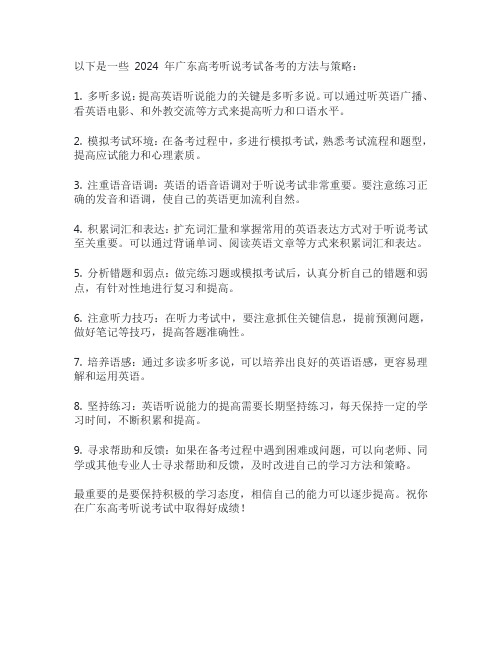
以下是一些2024 年广东高考听说考试备考的方法与策略:
1. 多听多说:提高英语听说能力的关键是多听多说。
可以通过听英语广播、看英语电影、和外教交流等方式来提高听力和口语水平。
2. 模拟考试环境:在备考过程中,多进行模拟考试,熟悉考试流程和题型,提高应试能力和心理素质。
3. 注重语音语调:英语的语音语调对于听说考试非常重要。
要注意练习正确的发音和语调,使自己的英语更加流利自然。
4. 积累词汇和表达:扩充词汇量和掌握常用的英语表达方式对于听说考试至关重要。
可以通过背诵单词、阅读英语文章等方式来积累词汇和表达。
5. 分析错题和弱点:做完练习题或模拟考试后,认真分析自己的错题和弱点,有针对性地进行复习和提高。
6. 注意听力技巧:在听力考试中,要注意抓住关键信息,提前预测问题,做好笔记等技巧,提高答题准确性。
7. 培养语感:通过多读多听多说,可以培养出良好的英语语感,更容易理解和运用英语。
8. 坚持练习:英语听说能力的提高需要长期坚持练习,每天保持一定的学习时间,不断积累和提高。
9. 寻求帮助和反馈:如果在备考过程中遇到困难或问题,可以向老师、同学或其他专业人士寻求帮助和反馈,及时改进自己的学习方法和策略。
最重要的是要保持积极的学习态度,相信自己的能力可以逐步提高。
祝你在广东高考听说考试中取得好成绩!。
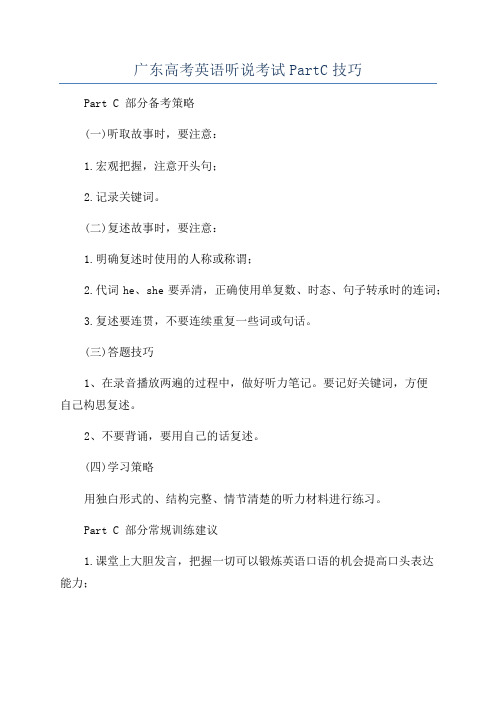
广东高考英语听说考试PartC技巧Part C 部分备考策略(一)听取故事时,要注意:1.宏观把握,注意开头句;2.记录关键词。
(二)复述故事时,要注意:1.明确复述时使用的人称或称谓;2.代词he、she要弄清,正确使用单复数、时态、句子转承时的连词;3.复述要连贯,不要连续重复一些词或句话。
(三)答题技巧1、在录音播放两遍的过程中,做好听力笔记。
要记好关键词,方便自己构思复述。
2、不要背诵,要用自己的话复述。
(四)学习策略用独白形式的、结构完整、情节清楚的听力材料进行练习。
Part C 部分常规训练建议1.课堂上大胆发言,把握一切可以锻炼英语口语的机会提高口头表达能力;2.充分利用课堂教学素材,选取故事性较强的文章或段落进行复述训练;3.有意识地培养速记的能力,积累丰富有效的速记符号;4.礼用旧题型的听力材料,进行听说训练。
忽略旧题型的选项部分,一边听一边记录要点,训练听取大意、获取要点以及已记录要点的能力,同时用自己的语言进行复述,强化故事复述能力的培养。
【考试时】高分技巧1.录音不宜太心急,一到录音时间就开始录音。
Is James interested in music like you?2.大声说英语从阅卷经验看,在每一部分的考试中,考生只要能说出相关的英语,回答的不管是一个一个短语,还是一个并不是很完整的句子,都会给分。
以2023真题Part B 为例。
Play the piano and violin. (得满分2 分)Piano and violin. (至少得1-1.5 分)Play piano/ violin. (起码有1 分)Piano/violin(起码有0.5 分)有把握时,请把句子说完整;把握不大时,说出句子的部分甚至一个关键的词也是很好的。
在回答Why....? 句子时,用了Because....来回答;在回答How many...?句子时,用了There are/ is...来回答,一样能得些分。
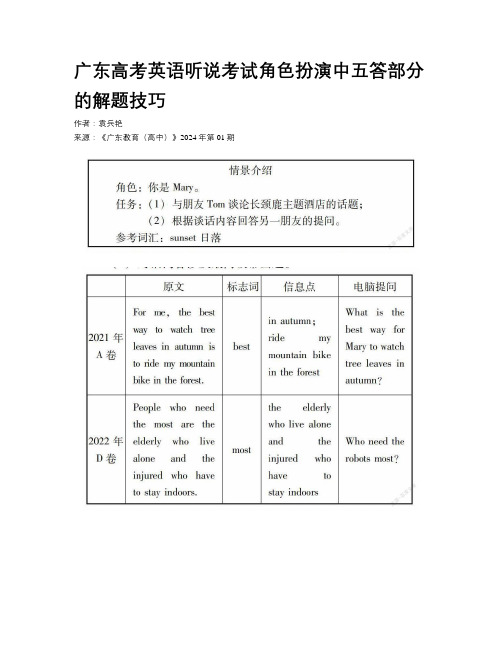
广东高考英语听说考试角色扮演中五答部分的解题技巧作者:***来源:《广东教育(高中)》2024年第01期广东高考英语听说试题中角色扮演部分主要从语言和信息两个维度考查学生的英语听和说的能力,其中信息维度主要考查考生准确获取有效信息的能力。
这意味着考生必须在听的过程中有针对性地捕捉信息、对信息点进行瞬间强化记忆并快速记笔记,然后准确回答出电脑提的五个问题。
但据笔者观察,不少考生在考试过程中或多或少遇到关键信息抓取量不足、信息抓取错误或速记方法不当导致漏听重要信息等难题。
考生如何在不可逆的听力过程中准确捕捉答题信息、快速记笔记、正确答题呢?笔者通过分析总结广东省近三年高考英语听说真题规律并结合高考备考教学实践总结出以下策略,希望能助力考生高考。
一、精读情景介绍,预测话题内容情景介绍主要包括两个部分:角色与任务。
角色部分交代考生所扮演的身份;任务部分则明确谈论的主题。
角色扮演的主题主要涉及个人经历,通过二人对话和考生翻译三个问题、电脑回答三问的方式交代什么人(who)在什么时间(when)什么地点(where)做了什么事、怎么做(what, which, how),对这件(些)事有什么看法或感受(how),今后或未来有什么计划或安排(what),被谈及的事物具有什么特点或功能(what, how)等。
以2023年广东高考英语听说考试A卷为例:精读情景介绍内容可知:考生所扮演的身份是Mary,谈论的主题是长颈鹿主题酒店。
涉及酒店的语境对话内容一般包含预订酒店、酒店特色与功能、入住注意事项、在酒店的活动等,因此,根据“长颈鹿主题酒店”这一主题,考生可以大胆预测以下内容:(1)Tom什么时候预订的长颈鹿主题酒店(when);(2)长颈鹿主题酒店在哪里(where);(3)长颈鹿酒店有什么特色(what);(4)Tom在酒店里做了什么,对酒店有什么感受(how);(5)入住长颈鹿酒店有什么需要注意的事项(what)。
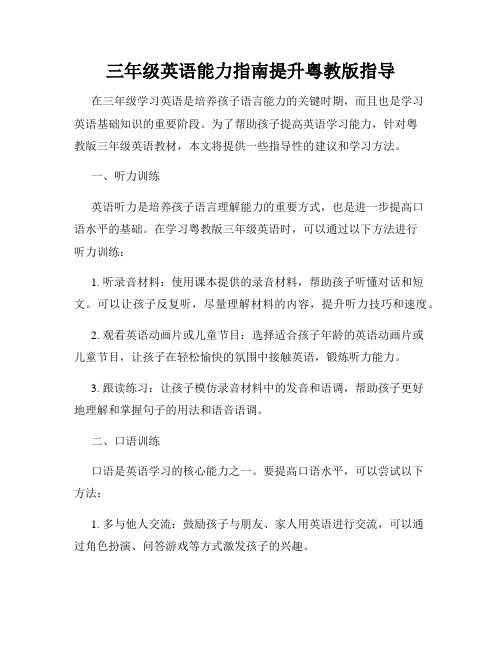
三年级英语能力指南提升粤教版指导在三年级学习英语是培养孩子语言能力的关键时期,而且也是学习英语基础知识的重要阶段。
为了帮助孩子提高英语学习能力,针对粤教版三年级英语教材,本文将提供一些指导性的建议和学习方法。
一、听力训练英语听力是培养孩子语言理解能力的重要方式,也是进一步提高口语水平的基础。
在学习粤教版三年级英语时,可以通过以下方法进行听力训练:1. 听录音材料:使用课本提供的录音材料,帮助孩子听懂对话和短文。
可以让孩子反复听,尽量理解材料的内容,提升听力技巧和速度。
2. 观看英语动画片或儿童节目:选择适合孩子年龄的英语动画片或儿童节目,让孩子在轻松愉快的氛围中接触英语,锻炼听力能力。
3. 跟读练习:让孩子模仿录音材料中的发音和语调,帮助孩子更好地理解和掌握句子的用法和语音语调。
二、口语训练口语是英语学习的核心能力之一。
要提高口语水平,可以尝试以下方法:1. 多与他人交流:鼓励孩子与朋友、家人用英语进行交流,可以通过角色扮演、问答游戏等方式激发孩子的兴趣。
2. 听力和口语结合:让孩子多听多说,在学习粤教版三年级英语的同时,尽量进行实际的口语练习,加强口语表达能力。
3. 创设情境:通过情境化的学习,让孩子在实际生活中运用英语,逐渐提高口语水平。
比如,在家里模拟购物场景、游乐园游玩等情境中进行英语交流。
三、阅读训练阅读是提高孩子英语能力的有效方法,同时也是培养孩子语言理解和表达能力的重要手段。
以下是一些阅读训练的建议:1. 阅读课本内容:认真阅读粤教版三年级英语课本中的课文和语法练习,帮助孩子理解英语句子的结构和意义。
2. 多读英文故事书:选择适合孩子年龄和英语水平的英文故事书,让孩子通过阅读故事提高词汇量和阅读理解能力。
3. 阅读练习:利用粤教版三年级英语的习题,让孩子进行阅读理解练习,提高对文章内容的理解和理解技巧。
四、写作训练写作是孩子英语能力的综合体现,也是培养孩子英语思维和表达能力的有效方式。

广东高考英语听说考试技巧息,以备后续问题回答。
4.在提问时,要简洁明了,避免使用复杂的语法和生词,确保计算机能够正确理解问题。
5.在回答问题时,要注意听清问题,理解问题,然后用简洁明了的语言回答问题,不要过度解释或跑题。
6.要注意语音语调的自然流畅,避免过度紧张和太快或太慢的语速。
同时,要注意停顿和节奏,使语言更加流畅自然。
等过渡词,要注意听清并记录下来,有助于复述时串联起故事情节。
8.在议论文中,要注意听清作者的观点和论据,记录下来以便复述时能够准确表达。
9.复述时要尽可能按照故事发生的时间顺序进行,不要遗漏重要信息点。
10.语速不要过快,要保持清晰流畅,注意语法和发音的准确性。
如果有不确定的地方,可以使用一些表达不确定的词汇,如“好像”、“可能”等。
When XXX and speaking exams。
it is important to use time sequence words such as soon。
before。
after。
when。
while。
assoon as。
since。
during。
eventually。
at last。
finally。
in the end。
immediately。
and on arrival to tell the story in order。
nally。
using the summary and keywords provided can be a helpful way to connect the n heard and retell the story accurately.When retelling the story。
it is important to use the correct tense and person。
and to XXX。
Pay n to pronouns。
singular and plural forms。
verb tenses。

英语听说实训总结
英语听说实训是一种提高英语听说能力的有效方法。
通过实训,可以训练听力、口语和发音等方面,提高英语水平。
以下是一份英语听说实训总结,供参考:
1. 认真听录音并记录关键词:在听录音的过程中,要注意捕捉关键词和短语,这有助于理解说话者的意思,并帮助记忆。
同时,记录关键词可以帮助自己更好地复习和回顾。
2. 练习发音和语调:发音和语调是英语学习中非常重要的一部分。
在实训中,可以练习发音和语调,模仿英语母语者的语音和语调,提高语音和语调的准确性。
3. 多练习口语表达:在实训中,可以通过和其他同学或老师进行交流,或者自己组织练习班来提高自己的口语表达能力。
在这个过程中,要注意练习口语的流畅性、准确性和语法规范性。
4. 多读英文原著或译作:通过读英文原著或译作,可以提高阅读理解能力,增强词汇量,提高语感。
在实训中,可以阅读一些简单的英文文章或书籍,并尝试用自己的语言进行翻译。
5. 利用网络资源:在英语听说实训中,可以利用各种网络资源,如在线听力课程、口语交流平台、英语角等,来提高自己的听说能力。
6. 反思和总结:在实训结束后,要及时反思和总结自己的学习成果和经验,发现问题,制定改进计划,从而不断提高自己的英语听说能力。
英语听说实训是一种有效的提高英语听说能力的方法,需要认真
练习和不断反思总结。
通过实训,可以提高自己的听、说、读、写能力,形成良好的学习习惯,为将来的英语学习打下坚实的基础。

随着我国经济的快速发展和国际交流的日益频繁,英语作为一门重要的国际通用语言,其听说能力的重要性日益凸显。
为了提高学生的英语听说能力,我们学校开设了英语听说课程。
经过一段时间的学习,我对这门课程有了更深入的了解,现将我的学习总结如下:一、课程概述英语听说课程旨在培养学生的英语口语和听力能力,提高学生的英语交际水平。
课程内容主要包括英语日常对话、听力理解、口语表达、语法知识等。
通过这门课程的学习,我不仅掌握了英语听说技巧,还拓宽了知识面,提高了自己的英语综合素质。
二、学习收获1. 听力水平得到提高在学习英语听说课程的过程中,我意识到听力是英语学习的基础。
通过大量的听力练习,我逐渐提高了对英语语音、语调、语速的敏感度,对英语口语表达的习惯和语境有了更深入的了解。
2. 口语表达能力增强在口语表达方面,我学会了如何运用正确的语法、词汇和语调进行交流。
在课堂上,我敢于开口说英语,与同学们进行互动,提高了自己的口语表达能力。
3. 交际能力得到提升英语听说课程使我更加注重实际应用,学会了如何在日常生活中运用英语进行交流。
这使我能够更好地适应国际化的环境,提高自己的交际能力。
4. 文化素养得到丰富通过学习英语听说课程,我对英语国家的文化、风俗习惯有了更深入的了解,拓宽了自己的视野,提高了自己的文化素养。
三、存在问题及改进措施1. 存在问题在英语听说课程的学习过程中,我发现自己在以下几个方面存在不足:(1)词汇量不足,影响口语表达。
(2)听力理解能力有待提高。
(3)口语表达时,语法运用不够熟练。
2. 改进措施针对以上问题,我制定了以下改进措施:(1)加强词汇学习,扩大词汇量。
(2)多听英语材料,提高听力理解能力。
(3)在日常生活中多练习口语表达,注意语法运用。
四、总结英语听说课程的学习使我受益匪浅。
通过这门课程,我不仅提高了自己的英语听说能力,还拓宽了知识面,提高了自己的综合素质。
在今后的学习中,我将继续努力,不断提高自己的英语水平,为更好地适应国际化环境做好准备。

广东省深圳市中考英语:听说考试的答题技巧和注意事项In the 2021 Shenzhen middle school English exam。
the score for listening and speaking has been increased from 15 to 25 points。
This increase in XXX that English is not only a subject。
but also a language。
The n of language is to be used。
Let's learn aboutsome tips for the middle school English listening and speaking exam!Part 1.n Types]1.XXX(4 points)2.n retrieval。
There are 10 small ns in total。
divided into 3 listening ns。
each XXX(10 points)3.XXX passage twice。
and it is divided into two parts:XXX(11 points)Part 2.Scoring Standards]1.XXX: read fluently。
XXX。
XXX。
2.n retrieval。
There are 10 small ns in total。
divided into 3 listening ns。
each XXX: listening details。
complete answers。
simple answers such as words or phrases cannot get full marks。
For example。
if the n is "How long will the man stay in the hotel?"。
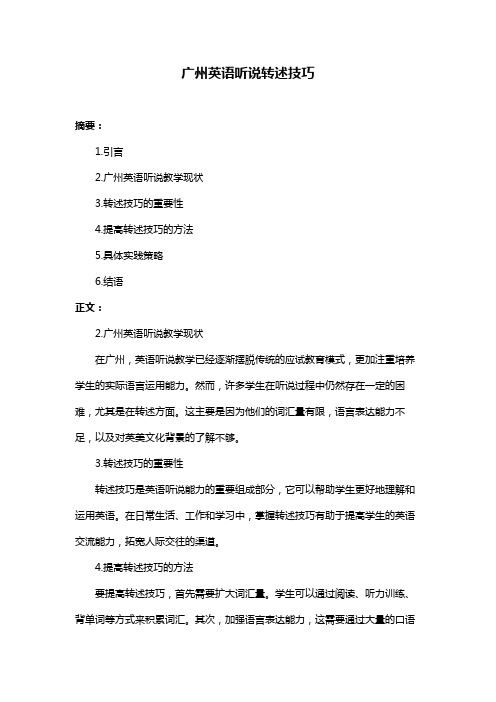
广州英语听说转述技巧摘要:1.引言2.广州英语听说教学现状3.转述技巧的重要性4.提高转述技巧的方法5.具体实践策略6.结语正文:2.广州英语听说教学现状在广州,英语听说教学已经逐渐摆脱传统的应试教育模式,更加注重培养学生的实际语言运用能力。
然而,许多学生在听说过程中仍然存在一定的困难,尤其是在转述方面。
这主要是因为他们的词汇量有限,语言表达能力不足,以及对英美文化背景的了解不够。
3.转述技巧的重要性转述技巧是英语听说能力的重要组成部分,它可以帮助学生更好地理解和运用英语。
在日常生活、工作和学习中,掌握转述技巧有助于提高学生的英语交流能力,拓宽人际交往的渠道。
4.提高转述技巧的方法要提高转述技巧,首先需要扩大词汇量。
学生可以通过阅读、听力训练、背单词等方式来积累词汇。
其次,加强语言表达能力,这需要通过大量的口语和实践来不断提高。
此外,了解英美文化背景也是提高转述技巧的关键。
5.具体实践策略在日常学习中,学生可以尝试以下方法来提高转述技巧:(1)多听多模仿:通过收听英语广播、观看英语电影和模仿标准发音,使自己的语音语调更加地道。
(2)注重口笔头练习:在日常学习中,尽量用英语记录生活琐事、课堂笔记等,从而提高自己的语言组织能力。
(3)分组合作:与同学一起进行英语口语交流,互相纠正错误,提高口语水平。
(4)参加英语角、辩论赛等活动:通过参加这些活动,锻炼自己的口头表达能力,更好地理解和运用英语。
6.结语在广州英语听说教学中,转述技巧的重要性不言而喻。
学生应该把握每一个实践的机会,不断提高自己的词汇量、语言表达能力和文化素养。
关于广东省英语听说训练
个人意见....请勿较真...
按顺序说吧
Part A :就是平时多读文章多注意语音语调,最好是尽可能模仿视频里的人的语气(虽然有时候那语调怪怪的),这部分不难,就是平时多练多跟读,一定要通顺然后有时候某词忘了也得含糊顺溜过去,要给老师一种你很厉害你很自信的感觉。
Paret B:我觉得有点难度,看运气碰到什么题,平时训练时就是要练就对信息点的敏感性,就是例如它的梗概是说去某演唱会,所以你要心里有数是谁的演唱会?什么时候开始?多长时间?什么时候结束?从哪买票?用什么交通工具去?和谁一起去?等就是心里有个数,然后听内容,一般都是这样的一开始的录音里内含1-2个五答里的答案,然后之后就是三问里面各包含一个,也可能会多一个。
(P s:一般问为什么xxx不自己开车,答案一般都是他车坏了),考时可以听学霸的跟着来,可是也别太天真了,一般学霸君一出口就是一溜串的,你可能根本来不及听他说了什么(此时只想说,说好的几个词回答的呢!!!!)
Part C:oh!!!超级难,先说训练方法,有底子的人,就是初中时听力就不错,平时单词也读音OK的那种,直接就是找听力一段文章的那种,可以直接是听力资料里的专项训练的资料C部分,一篇文章循环听,听到你大概能全部翻译出意思后去看答案翻译,对照来,然后顺便看看书上复述都是拿什么信息点什么不要,怎么组织语言。
基础较差的就先看梗概再这样练,基础更差的直接看着翻译练,一点一点提升,然后最坏的打算就是考前背篇文章,开头照题复述三四句,后来开始背文章,最后又接上题复述。
这部分练习用零散时间就好,像我就是走读生离家十几分钟那种,我就路上慢慢走慢慢听,提升很快的!佷快能听懂,但是实际操作复述还是要练的。
平时一直要听了,听了看资料答案是怎么缩减怎么复述,然后学习其中的技巧。
建议抽取点时间练一练速记。
关于考试,最好是找前辈,或者是在你之前考的人打听好机器好坏,机器可能真的会决定成败,我们这里是可以自由选择座位的,我不清楚别的地方可不可以,如果可以建议选最后一排或第一排,影响性较小,坐中间时就是周围一堆杂乱的声音,你能不被影响是最好,而且建议是和学霸坐的隔一点距离,太临近他大声,你的声音很有可能被盖掉影响你的成绩,调麦也要注意,这种技术性问题,想必老师会说,就不多讲。
一般都是分批考的,我们这是分五天,一天两批人,一批又分两个室,然后又分时间先后,一上午的人算一批,一上午三场,(我说的是我们这的考场设置哦,其他地方我不清楚的),所以呢,如果考场设置不够严密,第一场的人就可以透露题目给后两场的人,第二场的可能可以拿到一半的题目,第三场可能就是几乎有答案了,而且作弊手段是层出不穷,什么在电脑键盘哪哪塞纸条的都有,我是第三天下午第二批的第一场,一走出考场一堆高二的小妹追着问题目和答案赶着送去给后两场的人,所以人脉好的话要作弊其实真的很简单(我说我们这里的考场设置,可能其他地方很严格的话就不会),一般来说第一场的都是炮灰不管是哪一批。
还有如果有条件可以弄到答案的人,别装了也别倔了,几分碾压几千人,能用就用吧,别等到离分数线差那
么几分的时候来后悔。
正人君子能当饭吃吗,又没多少人知道你的正气,就怕考不上大学,还有监考老师一般都不严格的,但是也会走来走去什么的,我们这的就是,不管怎样这方面自己把握。
剩下就是声音大,但也不要太大,太大也是不好的。
自己调音时注意,然后特别注意的是电脑总是有块有慢,最好的程度是比别人慢一点,可以听见其他人答案,所以刚开始不要太快进入系统,我不知道这样能不能比较慢,反正我那时就是这样,然后就比别人慢了几秒。
还有就是“哔”一声之后,最好是3秒-5秒以后才开始念,因为电脑可能没那么快反应,你太快可能就录不到了,听说可以念几遍,但是我也不确定,虽然我这么做了,念错了也没关系,大气说声,sorry然后重新念那句。
整个过程尽可能表现自己很自信大气高大上,这样很加分,说话要有底气,就算是错的,也要让人听起来像对的一样,不会读的或者不懂得,可以略含糊地读读音,记信息点的时候也是这样,就好像你听到了答案,但是不知道那是什么词,例如airy吧,当时我们就是不知道是什么词,所以我们都在草稿纸上记得是“eiry”或者“eiri”最差也得记成“诶瑞”,这样就算不懂也能回答。
暂时先说这么多,可能忘了很多细节点没说,总体的都说了,如果我还想起什么重要的,我会补充,然后有什么想了解的可以找我,虽然地区不同,但是我想大体的应该是差不多的。
有什么地方说错了,或者错别字都包含。
最后祝大家考试顺利,别紧张,跟着学霸大声地念出来吧!!!
By:戏子-。